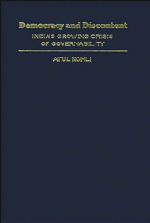Book contents
- Frontmatter
- Contents
- List of tables and figures
- Preface and acknowledgments
- PART I INTRODUCTION
- PART II THE GROWING PROBLEMS OF GOVERNING THE PERIPHERY: POLITICS IN THE DISTRICTS
- Introduction: the districts
- 3 Kheda, Gujarat
- 4 Guntur, Andhra Pradesh
- 5 Belgaun, Karnataka
- 6 Calcutta, West Bengal
- 7 Madurai, Tamil Nadu
- Conclusion: the districts
- PART III ORDER AND BREAKDOWN IN THE STATES
- PART IV CENTRALIZATION AND POWERLESSNESS AT THE CENTER
- PART V FINAL INFERENCES
- Bibliography
- Index
7 - Madurai, Tamil Nadu
Published online by Cambridge University Press: 05 June 2012
- Frontmatter
- Contents
- List of tables and figures
- Preface and acknowledgments
- PART I INTRODUCTION
- PART II THE GROWING PROBLEMS OF GOVERNING THE PERIPHERY: POLITICS IN THE DISTRICTS
- Introduction: the districts
- 3 Kheda, Gujarat
- 4 Guntur, Andhra Pradesh
- 5 Belgaun, Karnataka
- 6 Calcutta, West Bengal
- 7 Madurai, Tamil Nadu
- Conclusion: the districts
- PART III ORDER AND BREAKDOWN IN THE STATES
- PART IV CENTRALIZATION AND POWERLESSNESS AT THE CENTER
- PART V FINAL INFERENCES
- Bibliography
- Index
Summary
Madurai is an ancient temple town in south India. With a population just under 1 million, it is, after Madras, the second largest city in Tamil Nadu. Despite its size, Madurai is more like a sprawling premodern town than a modern industrial city. Except for a towering temple, it has few tall buildings. Paved roads run into dirt paths, and the city bazaars are reminiscent of an upscale, bustling village market rather than an urban shopping area such as one sees in Bombay, Calcutta, or even Madras. Less than a third of the working population, or less than 10 percent of the city's total population, is employed in manufacturing. That reveals the modest industrial base on which the city rests. The majority of the people are involved in the premodern service sector. Madurai is best thought of as an urban center that is halfway between a village and a metropolitan city.
Madurai's population has grown fairly rapidly over the past few decades. That has been part of a general statewide trend that has made Tamil Nadu one of the most urbanized states in India. One major result of that urbanization has been that many slum settlements have developed throughout Madurai. About 30,000 families, or one-sixth of the city's population, now live in some 100 slums.
Moving up the social hierarchy, for political analysis the remaining population can be divided along both community and occupational lines.
- Type
- Chapter
- Information
- Democracy and DiscontentIndia's Growing Crisis of Governability, pp. 154 - 183Publisher: Cambridge University PressPrint publication year: 1991



